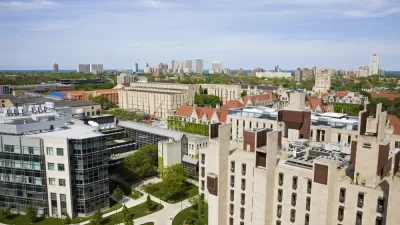Columnist Josh Leon agrees with Richard Florida's assessment that greater mobility would be better for the economy and the creative class, but wonders what will happen to the immobile and un-creative.
"The real problem in the ever-mercurial global economy is how to manage cities whose roles in it could become unmarketable by next week. The urban theorist Richard Florida argued in the March Atlantic that the answer was to redesign our urban geography for increased mobility. That way people can keep up with changing job markets and members of Florida's lionized "creative class" of white-collar professionals can find one another. The old system that encouraged home ownership should be jettisoned in favor of renting, which makes it easier for people to pick up and move without the time consuming agony of home selling. Cities should be more concentrated, less suburban, and more connected by public transit. I'm generally fine with those propositions, as are most urban planners. However, there are bigger issues at hand when we talk about enhancing mobility to accommodate the volatility of unleashed markets."
FULL STORY: Should We Abandon the “Uncreative Class”?

Maui's Vacation Rental Debate Turns Ugly
Verbal attacks, misinformation campaigns and fistfights plague a high-stakes debate to convert thousands of vacation rentals into long-term housing.

Planetizen Federal Action Tracker
A weekly monitor of how Trump’s orders and actions are impacting planners and planning in America.

In Urban Planning, AI Prompting Could be the New Design Thinking
Creativity has long been key to great urban design. What if we see AI as our new creative partner?

King County Supportive Housing Program Offers Hope for Unhoused Residents
The county is taking a ‘Housing First’ approach that prioritizes getting people into housing, then offering wraparound supportive services.

Researchers Use AI to Get Clearer Picture of US Housing
Analysts are using artificial intelligence to supercharge their research by allowing them to comb through data faster. Though these AI tools can be error prone, they save time and housing researchers are optimistic about the future.

Making Shared Micromobility More Inclusive
Cities and shared mobility system operators can do more to include people with disabilities in planning and operations, per a new report.
Urban Design for Planners 1: Software Tools
This six-course series explores essential urban design concepts using open source software and equips planners with the tools they need to participate fully in the urban design process.
Planning for Universal Design
Learn the tools for implementing Universal Design in planning regulations.
planning NEXT
Appalachian Highlands Housing Partners
Mpact (founded as Rail~Volution)
City of Camden Redevelopment Agency
City of Astoria
City of Portland
City of Laramie





























